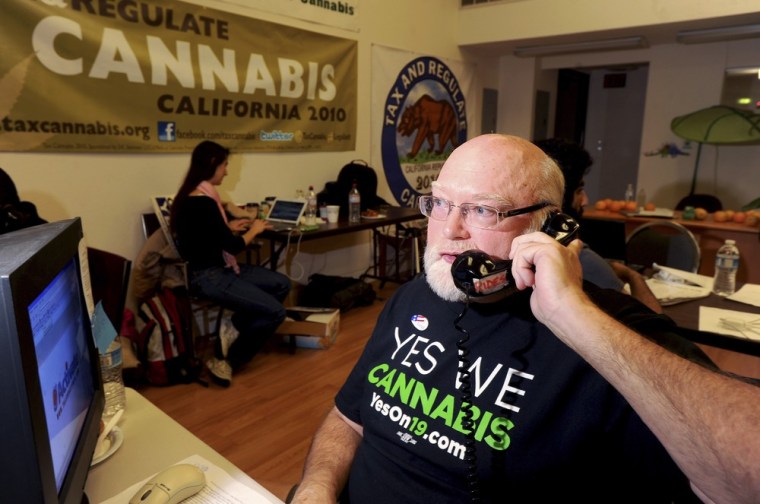Voters in four states rejected efforts to liberalize pot use in Tuesday’s polls, while in three other states they approved ballot measures that challenge the new health care bill. These were just a few of the ballot initiatives being considered in 37 states--on issues as diverse as soda and candy taxes, felons serving in elected offices and preparing for E.T.
In California, which arguably has the most pot-friendly population, voters nonetheless gave a thumbs down to legalizing possession of the drug for personal use. A proposal to allow marijuana use for certain medical conditions was defeated by a narrow margin in Arizona and resoundingly rejected in South Dakota. And in Oregon, where medical marijuana is allowed, voters said no to setting up a marijuana dispensaries to people who are approved for use.
In the highest profile battle over a ballot measure, advocates of California's Proposition 19 argued that legalizing possession of cannabis for personal use would allow the drug to be controlled and taxed and take it out of the hands of criminal gangs. There is an estimated $14 billion in illegal marijuana sales in the state annually.
But more Californians heeded warnings of legal chaos and other dangers and 54 percent rejected the ballot measure, compared to 46 percent who favored it.
Every major newspaper, both political parties, the two candidates for governor and all but a handful of leading politicians came out against it.
"Today, Californians recognized that legalizing marijuana will not make our citizens healthier, solve California's budget crisis, or reduce drug-related violence in Mexico," said the White House drug czar, Gil Kerlikowske.
Instead, he said, legalization would lead to more addiction, driving accidents and emergency room admissions.
Advocates of the measure say the issue is far from dead.
"It's still a historic moment in this very long struggle to end decades of failed marijuana prohibition," said Stephen Gutwillig, California director for the Drug Policy Project.
"Unquestionably, because of Proposition 19, marijuana legalization initiatives will be on the ballot in a number of states in 2012, and California is in the mix."
Shots at federal health care bill
Three states — Arizona, Colorado and Oklahoma — voted on measures to nullify the portion of the new federal health care law that would require state residents to buy health insurance. Oklahoma and Arizona approved the measures, while Colorado rejected the measure.
Colorado voters also decisively defeated an anti-abortion "personhood" amendment — similar to one rejected in 2008 — that would have given unborn fetuses human rights in the state constitution.
In Oklahoma, voters overwhelmingly passed three measures that had dismayed some progressive and immigrants-rights groups. One makes English the state's "common and unifying language," another requires a government-issued photo ID in order to vote, and the third prohibits state courts from considering international law or Islamic law when deciding cases.
Civil rights groups are already prepared to challenge the Islamic law measure. The Council on American-Islamic Relations announced Wednesday that its Oklahoma chapter will announce a lawsuit at a press conference with religious and civil rights leaders at the Oklahoma State Capitol Building on Thursday.
On a night of conservative advances in much of the country, Massachusetts voters spurned a chance to cut their taxes — rejecting a proposal to lower the state sales tax from 6.25 percent to 3 percent. Critics said the cut would have forced the state to slash $2.5 billion in services, including local aid to cities and towns.
On casinos, candy tax and the study of UFOs
- Oregonians rejected a proposal to allow casinos, while in Maine the vote count on a similar measure was too close to call a day after voting.
- Washington state's voters repealed taxes on candy, soda and bottled water adopted by lawmakers last year — a move that could eliminate a projected $352 million in revenue over five years. Voters rejected a proposal to impose a state income tax on any income above $200,000, or $400,000 for couples.
- In Illinois, where the two most recent former governors have been convicted on federal charges, voters approved an amendment that enable future governors to be recalled by popular vote.
- In Colorado, voters rejected three measures that would have banned borrowing for public works, cut the income tax and slashed school district property taxes. Opponents said the proposals would have cost the state $2.1 billion in revenue and eliminated tens of thousands of jobs.
- In the nation's littlest state, voters chose to keep the longest formal name — opting to stay as Rhode Island and Providence Plantations, instead of just Rhode Island.
- In Denver, some outward looking citizens managed to get Initiative 300 on the ballot. If approved it would have established an Extraterrestial Affairs Commission. The commission would be charged with collecting information on visits from aliens, to assess risks and to ensure safety in "potential interactions with extraterrestial intelligent beings or their vehicles." Denver voters were in no mood for it, however, and firmly rejected the initiative.
